10 Easy Solutions to Travel & Avoid Contributing to Overtourism Issues
“With more people travelling than ever before, how can we continue to do so and avoid contributing to overtourism issues?” ~ Alyse.
Are there any overtourism solutions?
Only a decade or two ago we were yet to see any effects of overtourism. When friends or family travelled abroad back then, it used to be a massive deal. You’d see them off at the Departures hall at the airport, complete with hugs and maybe even tears. They’d set off on their journey and return some weeks later with loads of gifts, photos and stories from what they considered to be their trip of a lifetime.
Today, travel is no longer treated as this occasional luxury. In fact, in recent years the combination of travel becoming more affordable and the rise of the middle class in Asia means more people are travelling than ever before. Unfortunately, these increases are having dire consequences on some local populations.
Perhaps if you weren’t travelling about 8-10 years ago, you may not even be aware of the differences to tourism these increases have caused, so I’m here to shed a little light to put things into perspective and explain why it’s crucial to know how to not look like a tourist when abroad.

I first published this article in March 2019 and have updated it since. My guess is if you’re reading this, you’re probably interested in finding out if there are any solutions to tourism problems. How can we travel and avoid contributing to overtourism?
As a travel blogger, I feel as though it’s my responsibility to be part of the solution, not part of the problem of overtourism. With this article I’m hoping to spread the word, beginning with you.
Yes, you!
I don’t have all the answers, but I believe there are ways we can help to fix overtourism, which I’ve written about in detail below. We all just need to start somewhere. Even the smallest of well-meaning gestures can help in curbing problems with tourism.
I think the last point may be one of the most important and I wonder if you’ll agree. On a scale of 1 to 10, how “invisible” are you? Read on to find out more!
This article will cover my top 10 overtourism solutions:
|

This article forms part of my top strategies for to how to be a responsible a tourist, detailing effective tips towards ethical tourism to benefit visitors and locals alike. It’s also one of many strategies I discuss further in my book, “How to Not Look Like a Tourist: Unlocking Your Hidden Power for Overtourism Solutions” – take a look once you’re done here!
Overtourism solutions: How to avoid contributing on your next trip
Solutions to tourism problems
Nobody likes an annoying tourist. So how can you avoid being one without contributing to tourism problems? There a few key things to consider regarding your travel style first. Some points may be obvious, but others you probably haven’t though of!
If you’re after the “authentic” travel experience people seem to bang on about these days, contrary to popular belief you won’t get it by staying in an Airbnb and watching Netflix whilst nibbling snacks at your destination. You’ll get it by being a more mindful and responsible tourist.
An invisible tourist.
Let’s get into my 10 overtourism solutions and how you can still travel while helping to combat overtourism at the same time:
1. Stay longer at your destination
How is this an overtourism solution?? I know this sounds counter intuitive, but hear me out.
The majority of travellers only seem to spend a day or two visiting a city. This means overcrowding is all too easy as tourists rush around from place to place because their time is very limited. Travelling in this way can have a crushing impact on local’s quality of life, and other tourists for that matter.
If you stay longer at your destination, there’s suddenly no need to cram everything into a short timeframe. You’re able to visit popular tourist attractions during less busy periods, even visit some museums or galleries at night when the day trippers and large tour groups are long gone. You’ll be able to have a more enjoyable experience without the overwhelming burden of crowds and getting elbowed in the ribs every few moments!

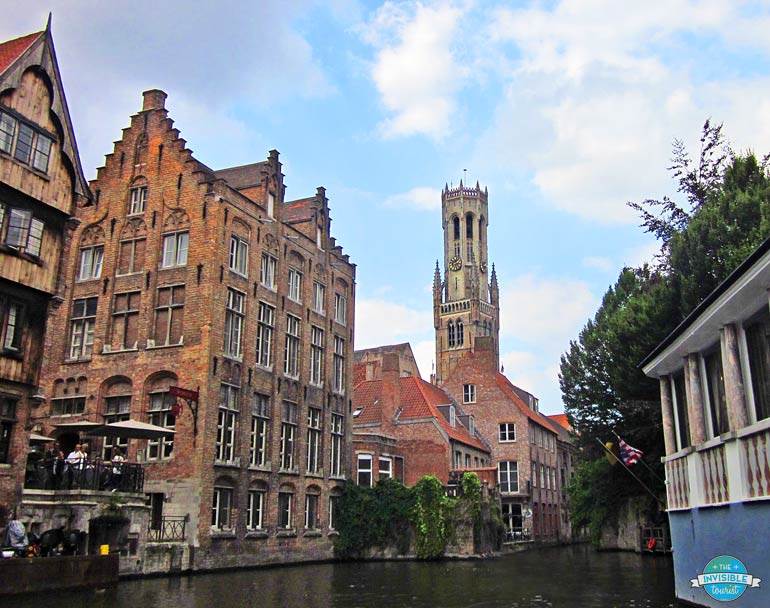
2. Stay in central accommodation (& avoid Airbnb)
Make the most of your travel time by staying in a centrally located hotel, hostel or traditional B&B. You’ll be able to skip getting the train and bus into the city centre each day at your destination. This saves you a lot of time as well as transport costs. The added bonus for locals here is you won’t be taking up a valuable transportation spot a commuter could use during rush hour.
With only a casual stroll back to your accommodation, you’ll also be able to see the town from a different perspective during the night and enjoy places day trippers miss out on! I believe this is one of the underrated overtourism solutions.
By staying in a reputable, centrally located hotel, hostel or traditional B&B, you’re helping to avoid contributing to issues affecting locals from Airbnb and similar homestay accommodation around the world. Unlike Airbnb which is unregulated, these traditional accommodations are always in areas zoned for tourists so they minimise disruption to locals. They’re in areas where high pedestrian traffic is expected and usually tucked away from residential areas.
Unregulated homestay accommodation such as Airbnb in city centres are taking away long term accommodation for residents, and are sometimes not in areas zoned for tourists. Noisy tourists coming and going it all hours in a quiet neighbourhood may be detrimental to locals’ quality of life. Locals are trying to sleep as they have work the next day and won’t appreciate boisterous tourist antics at 4am! No one likes being kept awake by commotion outside.
TIP: These ethical Airbnb alternatives will help you find hosted stays at your next destination and other options that ensure you won’t inadvertently be taking long-term accommodation from local residents.

3. Explore off the beaten path
There’s SO much more to any destination than what’s limited to the photos you see on social media. Even wandering a few streets away from the popular areas will allow you to discover unique treasures, like these hidden gems in Kyoto! We need to try and lessen the impact of our heavy tourist footprints on local communities by doing what we can to dilute crowds from the most heavily visited areas.
Not only will this help minimise the negative impacts of overtourism, it will also give you a greater appreciation and understanding of your destination beyond the tourist hot spots.
You can also help bring new business less-popular and less-visited nearby cities of your main destination. If you’re planning to visit a super busy place, research some nearby alternatives you can add to your trip to help enrich your experience. Local sales people, restaurant owners and the like in these less visited-areas will love you for it!


READ MORE:
Overtourism in Japan: Becoming A Victim of its Own Success?
Stunning Destinations to Discover in Japan Off the Beaten Path
4. Support local businesses
Get behind small companies! Allow yourself to travel independently where possible by avoiding large tour agencies where money doesn’t trickle back down to local communities. Although I am not entirely against cruises myself it’s a fact that cruise companies are notorious for this.
According to Skift, European cruises have been significantly increasing their frequency in recent years, which has been one of the causes of overtourism in coastal cities like Barcelona and Venice (more on this down the page).
Even though tourists are visiting a city, on a major cruise it means they aren’t staying in local accommodation, aren’t eating all local food most of the time and aren’t spending much of their money in the local community. The majority of their spending goes back to the major cruise operators and the locals bear the brunt of the negative tourism traits without even seeing much of a financial benefit.
One way to see a city and contribute back to the local community is to hire a private, local guide to show you around and share their knowledge with you and participate in local cultural experiences.
TIP: My personal favourite sites to find authentic experiences and local guides are Klook for destinations globally and Arigato Travel and MagicalTrip for Japan. Read more here about the cultural experiences I’ve personally tried and enjoyed in Japan!
I probably wouldn’t have known about this gorgeous cave pictured below on the outskirts of Athens had I not hired a friendly local guide for the day!
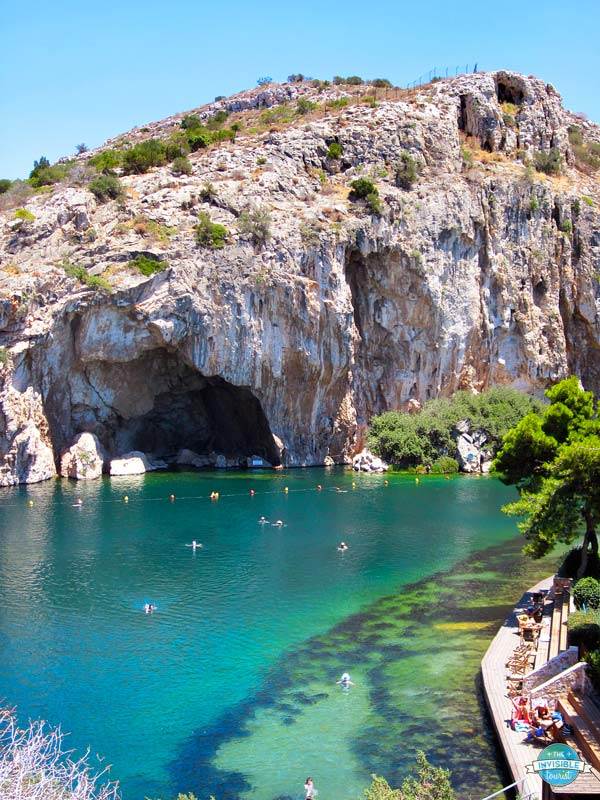
TIP: If you’re worried about travelling independently, don’t be. I’ve shared my personal, detailed itineraries in various destinations around the world to help make things easier for you. Being prepared means you’ll have the confidence you need to travel on your own!
5. Respect locals going about their day-to-day lives
Although it may be your holiday, it’s important to remember to be respectful to locals who live and work at your destination with this overtourism solution. Here’s how:
Respect private property
While it’s hard to imagine sometimes, try to put yourself in a local’s shoes. You wouldn’t want random people trespassing on your fancy front porch in the name of “doing it for the ‘Gram”, would you? During one of my visits to NYC, being a fan of Sex and the City I wanted to find the building that was filmed as Carrie Bradshaw’s apartment.
The disgruntled residents must have been so fed up with people cramming their staircase and getting in the way (and rightly so). They had chained off the entryway and left a note to remind tourists this was their home, so to take a quick photo and be on their way. Respectfully, this is what I did (while cropping out the chain).
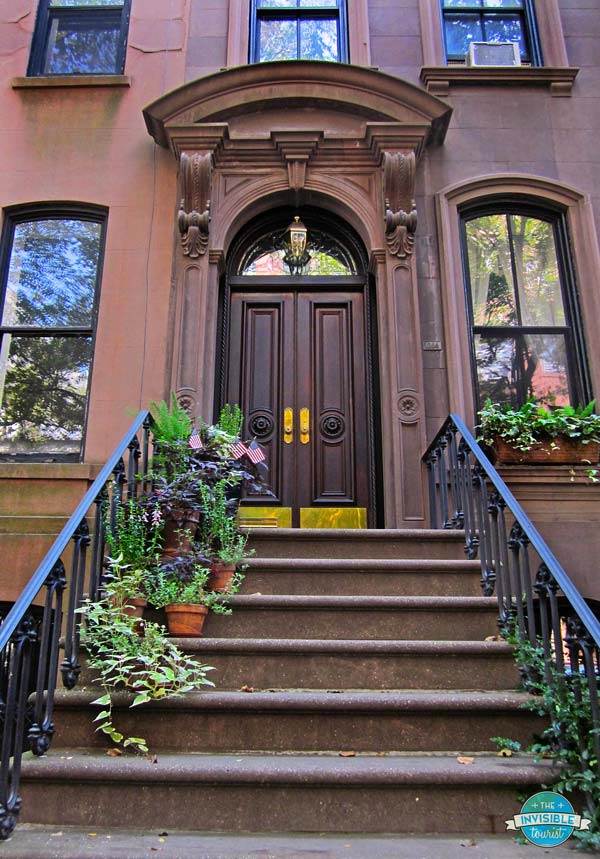
Don’t abuse public transport
Tram #28 in Lisbon is a regular commuter tram. Although, you’d never guess because it’s been completely inundated by tourists wanting to get around the city on the cheap. The line of tourists stretches so far that locals can no longer use this mode of public transport for their commute to work, seeing as queues for an hour or more are not uncommon.
This really sucks for locals trying to go about their daily business.
You’re on holiday and should have all the time in the world, right? It’s up to you to make a conscious effort to explore by another means if you don’t want to make life difficult for locals, and yourself. You’ll definitely get to see more when you wander leisurely on foot (and in the time you’d spend lining up, no doubt). Stay longer, take your time and enjoy!
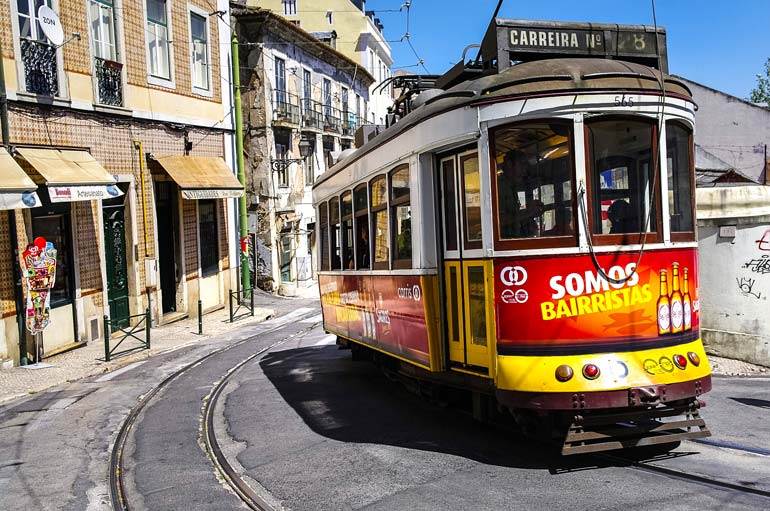
Obey the local road rules & parking regulations
If you’re driving around in a new country make sure you know the local road rules and any parking regulations. It’s never a good idea to park illegally as this can result in hefty fines or your rental car being towed. What an inconvenience that would be on holiday!
In the small village of Shirakawa-go in the Japanese alps, there’s an increasing number of tourists parking illegally, making it difficult for locals to go about their business. For such a small town, it has designated parking areas and simply cannot sustain numbers of illegally parked cars.
TIP: Also remember, some countries drive on the LEFT hand side of the road, which may be a challenge to get used to at first.
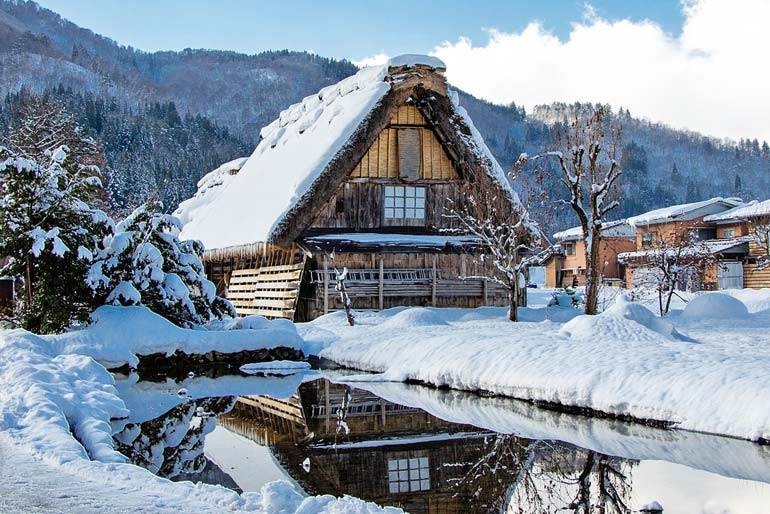
6. Respect the local environment
In isolation, it may seem that a sneaky action of disobeying rules to get a shot for Instagram isn’t going to make much of a difference. This may be true, but when combining everyone’s “isolated” actions it becomes very unsustainable for the environment.
We need to think beyond ourselves and at the bigger picture. There are a few ways to respect the environment when travelling to avoid contributing to overtourism issues:
For future generations and other tourists
Firstly, respecting the environment may mean finding a less-visited alternative to a popular attraction. The overwhelming influx of visitors to Iceland in recent years resulted in many popular photo spots like Reykjadalur being closed off to tourists for months. Delicate ecosystems have come under strain from too much tourist love (and disobeying signage), and nature needs time to recover before the damage becomes irreversible.
Furthermore, Maya Bay in Thailand (more popularly known as James Bond Island) has recently been closed to allow time to heal and recover from unsustainable visitor numbers. While this may seem like an inconvenience if you were planning to go, it’s important to remember that this action will help save these environments and allow them to be around for future generations.
While this may be inconvenient to your travel plans, it truly is one of the overtourism solutions we see immediate benefits from once enforced.

For your own safety
Sometimes the warning signs are there to save your life – did you see the crumbly cliff edge you were about to take a selfie on? Or the warning notice about rips occurring at the local beach? With the increasing numbers of tourists around the world, there has also been a correlation to tourist-related injuries and deaths.
In 2011 there were only 3 selfie-related deaths recorded. Did you know that number greatly increased each year to reach to 93 in 2017? Combining all records from 2011 to 2017 brings us to a staggering 259 selfie-related deaths.
While this sounds like a cliché, please respect the environment and any warning signs for your own safety – no one wants to become a statistic.

For natural wonders and UNESCO World Heritage sites
Resist the unusual urge to carve your name into trees or stones as this causes irreversible damage to significant attractions. In Kyoto, Japan, tourists have been vandalising the bamboo by etching their names into the UNESCO World Heritage Arashiyama Bamboo Forest, causing significant destruction. If everyone did that, there soon may be no bamboo groves left for anyone to enjoy. That would be an absolute shame!
If you’re hiking or camping in the wilderness, please follow the “leave no trace” principle. Take home everything you brought along with you and nothing you didn’t.

For animal welfare
If drones are not permitted where you are, please don’t be the knob who disregards the rules. In some destinations such as Australia, drones are considered aircraft so it’s necessary to learn the regulations beforehand. There are also restrictions for flying your drone over waters when whales are present, as drones have also been known to disrupt wildlife and birds. Unless you work for National Geographic, do you really need to?

Additionally, please consider the ethics related to animals used in tourism. Some animals are being exploited in order to attract your tourist money, like the riding of elephants and patting chained tigers in Thailand. An alternative is to visit an elephant sanctuary where the animals are rescued from cruel conditions and nursed back to health.
In Santorini, Greece, it’s been revealed that donkeys have received spinal injuries from lugging tourists up the 600 stairs from the port to the main town, a well as being worked to dehydration in extreme heat. For the sake of the donkey’s welfare, the cable car is a much more efficient way to journey up the cliffside from the port. You’ll also feel better for doing so and the donkeys will thank you for it!

READ MORE: How to NOT Look Like a Tourist in 14 Easy Steps
7. Respect local culture
Each culture is unique and has its own significance in the world. Their differences are what makes them so special. But what happens when we end up turning all places into the same ordinary mono-culture? When the local etiquette, language and cuisine are slowly eroded away by overtourism and replaced by a barrage of the same stuff you see everywhere else? What if the unique cultural differences that attracted us to a destination eventually disappeared?
Some tourists can be pretty demanding folk and expect things to be the same as home when they travel. Alternatively, we should do what we can to help preserve what makes each destination exceptional, and it starts by respecting the local culture.
Learn some local language
As I point out in many of my travel guides and itineraries, try your best to greet locals in their native tongue. It goes such a long way! Not only does this help preserve the local culture, it goes to show you have made a the first step in understanding their culture and appreciating their way of life. This can be one of the most fun overtourism solutions – really!
I’ve become quite the language hoarder over the years – I am not fluent in any, though! However, learning bits of local languages has helped me get off on the right foot with countless locals I’ve encountered. I can say basic greetings and phrases I’d need to get by in Japanese, French, Italian, Spanish, Greek and a few more. But how do I learn so fast? Find out in my guide to learning language for travel.
Clothing & etiquette
From wearing the appropriate clothing inside religious structures to the correct etiquette when eating out and using public transport, respecting the local culture can come in many different forms. What may seem normal to you may actually be a taboo at your destination so it’s important to find out any cultural do’s and don’ts before you make a fool of yourself.
Don’t be that annoying bikini-wearing tourist wandering the streets if a beach is not visible nearby. In many places this is not appropriate.

Embrace local cuisine
Respecting local culture also intertwines with embracing their cuisine. Unfortunately, over the years I’ve seen first hand how local cuisine at popular destinations is getting pushed out of cities in favour of foods where tourists originate.
There are many instances of this happening across Europe (Lisbon is one such example). During my visits over the years to Surfers Paradise, Australia and Queenstown, New Zealand, I’ve noticed the traditional pub culture is slowly being eradicated and replaced by Chinese and Indian establishments to entice these new visitors from Asia.
What’s wrong with tourists sampling the local cuisine? Is there a point of going to a new country to only eat the same food you would at home? Surely this defeats the purpose of travel?
8. Travel during off-peak periods

This is one of my favourite overtourism solutions. Travelling during the off-season or shoulder season is not only a great way to save a little money for yourself, but also brings tourism dollars (or insert other currency here) to locals at times when they actually need it. Visiting Paris in March is the perfect example. Hotels and flights cost less and crowds are also much smaller during these times. It’s a win-win and one of the most important overtourism solutions!
By travel during off-peak periods, I’m also talking about daily as well as seasonally. If you have suitcases, try to avoid catching public transport during rush hour where commuters are already fighting it out to get to and from work. If it’s possible, you can also try to avoid travelling during major public holidays where crowds are already expected to be huge, like if you’re planning a trip to Japan around Golden Week, for instance.
Places like Barcelona, Lisbon, Venice and Santorini have been bombarded with cruise ships and day trippers throughout summer in recent years, causing massive crowds and major overtourism issues. Local’s lives are becoming affected negatively and the rate this is happening is not sustainable.
Sure, the weather may not be as desirable for travelling during the off season, and you may have to deal with dreary weather, extra clothing and snow in some locations (but the weather can also surprise you, like it did during my week in Switzerland during winter!) But that sure as hell beats being having to navigate through overcrowded areas and narrow cobbled streets like a watermelon squeezing through a toilet roll, right?

READ MORE: Why You Should Never Leave Love Locks in Paris (or, Anywhere)
9. Be prepared and research your destination before you get there
I firmly believe this is one of the best overtourism solutions. Know what attractions and things to do there are at your destination to prevent wasting time figuring it out on the go once you arrive. Planning this way also gives you an insight into how long you should stay at a destination in order to give yourself enough time to see everything you want.
Learning beforehand about the significance of attractions will help make your visit a more meaningful one. There isn’t much point getting a photo at a temple or monument if you don’t know much about its history or why it’s an important part of the local culture. This is why finding out about any UNESCO sites is helpful. There’s so much more to travel than likes on social media for capturing the same shot as everyone else.
It’s also incredibly handy to research how you will get around at your destination in advance. Will you be catching Metros, busses, taxis or exploring on foot? Keep in mind… The cheapest option may not be the most sustainable option, but I believe as tourists it’s a price we are obligated to pay.
If people spent as much time researching their travels as they did posting endlessly on social media about what they ate for lunch or without really knowing about what it is they’re sharing, tourism pollution would be on its way to being a thing of the past.

10. Travel for YOURSELF, not for validation from others
These days it’s so easy to be influenced by the highlight reels of social media. I’d be lying if I said I wasn’t inspired to visit somewhere because I saw it on Pinterest. Sure, social media can inspire travel but it should be only used as a starting point for researching the destination further, not be the sole focus of travel.
Make sure you go someplace because it interests you, it resonates with you, you’re intrigued by the history and culture. Not just because people you know went there or you want to showcase the same shots on your Instagram as everyone else to keep up appearances.
If you travel somewhere to simply check it off your list and say you’ve been to impress others, is it really going to be worthwhile, enjoyable or memorable if you don’t have an appreciation for what’s there? I dare you to try and be in the moment during your next trip.
Allow yourself to be fully immersed in the destination and enjoy it through your own eyes, not the screen of a smartphone.


Concluding my solutions to tourism problems
The negative effects of overtourism have only begun to surface. From the solutions I’ve listed above, I hope I’ve inspired you adopt some of them to avoid contributing to overtourism on your next trip. There are now all too many examples in popular destinations of what happens if we don’t embrace local culture and the differences to our own.
As guests in a new place, we should be expected to act in a respectful manner to our hosts and adapt. Why should they change their cultural heritage that dates back hundreds – if not thousands – of years to appease us tourists?
To help respect and preserve local culture, grab your invisibility cloak and try to blend in! Learn the local lingo beforehand, correct etiquette and sample local cuisine. Stay longer, search for alternatives and be prepared. These steps will help to prevent the diluting of native culture through hoards of tourists demanding otherwise. Each of my travel guides and itineraries for many destinations around the world show you how!
We don’t want to lose what was already there by replacing it with something ordinary that can be found anywhere else. Even the little things you do count towards more sustainable tourism! Do you agree? Let me know if you’ll use any of these overtourism solutions on your next trip!
If you’d like more tips to combat overtourism, come and join me on Facebook, Pinterest, Instagram and TikTok for more.
Until next time,

Like it? Pin it! 📌


This guide to overtourism solutions contains links to my affiliate partners Klook and MagicalTrip. I may earn a small commission if you decide to click through and make a purchase so if you do, thanks for your support! This helps with the costs of running my blog so I can keep my content free for you. As always, I only recommend a product or service that I genuinely love and use myself!

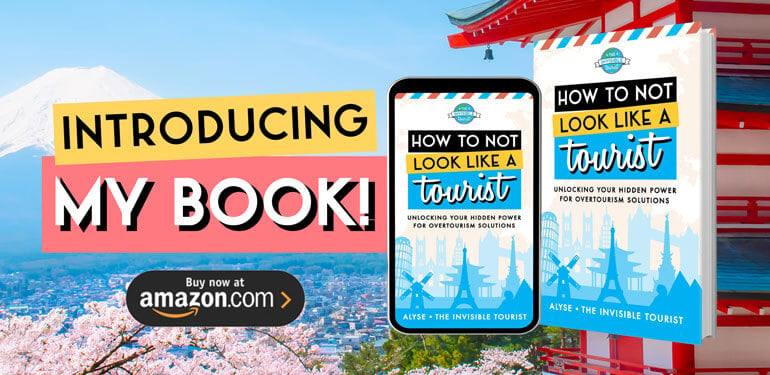
Yes! I’m part of a subreddit that…well, clearly means well, but it takes a very dim view of travel, partly for this reason. They’re always like, “Just stay home!” But (as we all found out in 2020), sometimes you just get tired of looking at your own four walls, and tired of taking your umpteenth Zoom call while your toddler screams, your dog has an accident on the carpet, and your spouse walks by in their underwear. There has to be a middle ground between “stay home” and “make overtourism worse,” and I do believe you have found it. 🙂
Oh Angie, your comment has absolutely made my day – thank you so much!
Trying to help fellow travellers “blend in” is what I live for 😊
Your thoughts are so relatable haha. Let’s hope we never have to live through anything like that again!
The world is wide and able to share many beautiful lessons with us… why spend life confined to one place?
Thank you for reading!
I do agree with this concern.. i am from India and used to travel many destinations.. you have mentioned here all the important facts we should consider about over-tourism problems.. thanks a lot
So glad you agree and found my guide helpful! Thanks for your comment, Anirud 😊